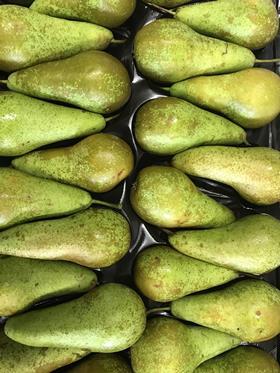
Think organics and the US, UK, Germany and France probably spring to mind, but these aren’t the only countries experiencing growth in the market. The Netherlands is another nation trying to boost its market share in organics and as more and more producers try to cash in, the extra production is likely to bring down prices and accelerate market growth, according to the Netherlands’ largest organic topfruit grower.
Robert Elshof, who owns Elshof Organic Fruit, supplies Holland’s largest supermarket, Albert Heijn, as well as retailers in Scandinavia and Germany. Although he doesn’t work with any British supermarkets at present, he was recently approached by both Tesco and Sainsbury’s about the possibility of supplying them too. “We produce high-quality organic Conference pears and that’s interesting for the British market,” he explains.
Elshof predicts that the organics market will continue to grow at 10-20 per cent a year across Europe, attracting new growers to the sector and creating a bubble of extra production that will bring down prices and spur faster growth. “Maybe this is necessary to make the market more mature and bring more volume to it,” he says. “Right now the prices are too high for some consumers but when prices are 20-30 per cent lower the market will be able to grow faster.”
The danger, of course, is that if prices go down too far, growers will stop deciding to move into organics. This year, prices for conventional fruit have also been very high, lessening the incentive to switch, but this did not prevent two of the Netherlands’ biggest fruit growers launching organic trials last year. “It’s becoming more normal to buy and eat organic products and the economy is going very well in Europe so people have more money to buy the products,” Elshof explains.
His company is currently building a large storage facility for its organic pears, 90 per cent of which are Conference. While the business is always exploring opportunities to grow new varieties, Elshof says there is already a good market for organic Conference in the Netherlands and its other European destinations. One way the grower is looking to improve its offer is by developing new Conference varieties with smoother skin and Elshof thinks a new variety called Elina, which he planted eight hectares of last year, has a bright future. Organic Conference tends to have quite a rough, brown skin and this can prove less appealing, especially to first-time consumers, he explains.
In apples, Elshof has his very own organic variety, called Bellebio, which he says is similar to Pink Lady and can be stored “for a very long time”. “We’ve seen that the supermarkets prefer apples from their own country so we’ve developed a homegrown apple with a long storage life,” he says.
“The Dutch consumer, and especially the environment-conscious organic consumer, likes Dutch varieties so if retailers can avoid having to bring in apples from Argentina and Chile, I think it will be interesting for them,” he says.
In three years time Elshof expects production to more than double as he strives to meet growing demand for his fruit. Only time will tell how long this trajectory will continue.



